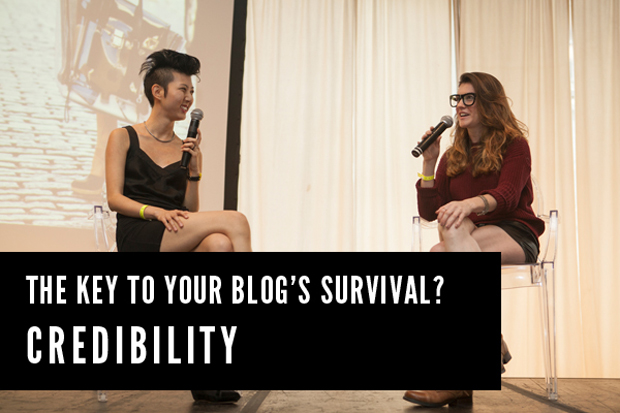When you’re buying and receiving a lot of beauty products to test for the site you do end up with some ‘bad‘ products. And by bad I mean in the sense that they do not fit me due to various reasons. Some might be personal and sometimes when a lot of people agree on this, it might actually be that the product is lacking in some aspects.
Are bloggers losing their credibility?
More than once I stumbled upon a Twitter conversation questioning the credibility of some bloggers regarding the items they receive and stating that they lack critical reviews. And rightfully so. You have to be critical about everything you hear, read and see, no matter where the info comes from. Does that mean all gifted posts are biased? It depends. I do believe gifted products are more likely to be blogged about. I mostly give priority to gifted items over the ones I bought myself simply because of the huge amount of products that need to be written about outnumber the limited amount of time I have to actually do it. But stating that all of these posts the products are viewed more positively would defy the true meaning of what a blog supposed to be. And as I am a blogger myself (who’s lucky to be provided of testing material every once and a while) I will strongly deny that is the case, at least for my own blog. I can’t speak on behalf of others since I don’t have a clue about their work ethics.
Anyone who reads my blog will know I’m not afraid to get my hands dirty on some subjects. So why would it be any different for product reviews? I think being honest about your experiences is the main charm of blogs and staying true to yourself and your readers is extremely important. I even use my own blog as a reference to keep track of the things I tried and (dis)liked in the past and use those experiences for future purchases.
So the big question is; why aren’t there that many negative reviews? The response I often hear: ‘because they are gifted’ doesn’t make any sense to me. Most bloggers are not paid for these reviews and why would anyone want to receive a product that sucks anyway? Any thoughts, because it’s a bit confusing..
All of these things put aside.. I’m not saying it doesn’t happen. Bloggers are only human, and sometimes they’re persuaded to pick the forbidden fruit. There have been times when I heard a blogger say they thought the quality of brand X sucked. But when there were exclusive event invites and presents that were handed out; they happily accepted them and afterwards stated brand X was one of their favorite brands. You have to be aware that it happens.
Staying positive
So why aren’t we seeing more negative reviews? I’ve confronted some bloggers with this issue and I keep on getting the same response that they are trying to maintain a positive vibe on their blogs. And I get where they’re coming from. You’re trying so hard to create this positive experience for your readers, using beautiful pictures and carefully written texts, in the hopes of making them regulars. And you also want to create this positive feeling for yourself. It’s one thing to mention a product you think is bad. Spending hours on a post for a product you really don’t like is something else. By overthinking all of the reasons why it is you don’t like this product, you’re surrounding yourself with negativity, and that can be very tiring and difficult to keep up in the long run. I blog as a hobby and there are other ways I’d like to spend my free time that are more positive. So yes, I tend to avoid blogging about these products, but that doesn’t make me any less critical.
I like to arrange my product reviews into 3 categories; 1) products I really like 2) products I think are okay (depending on the traits I’m looking for in the product) and 3) the products I don’t like. The products in the second category are the hardest to write about.
A word of advice
Bear in mind that as a blogger your credibility is your best asset when it comes to building and maintaining a following of readers. Your readers will reward you with their loyalty as long as they know you are straight with them. If your readers feel you are too biased in your product reviews you will lose credibility and your readers will lose their faith in what you have to say.
My golden review tips for bloggers:
On reviewing
- learn to say no: only review stuff you would actually buy yourself as if you were just another ‘normal’ customer in a store (in other words, things that pique your interest)
- let the company or person whose asking you to review a product know you’ll be fair and unbiased in your review. This isn’t the easiest step as a lot of brands will simply send you random stuff once they get your address. I’d personally prefer it if they contacted me first so I could tell them if I was interested or not. It’s not always the case.
- publish a disclaimer somewhere on your blog in which you discuss some of your key ethics on reviewing
- be a consumer first, then a blogger (what would you tell your friends when they asked you about it?)
- never ever accept an offer from a brand to write a ‘good’ review when you haven’t even tried the product yet or you don’t like it.. even if they want to pay you.
- always do your research
Dislike a product?
- keep the balance: hey, it’s okay…to talk about the things you dislike. Just try to find a certain balance between the positivity and negativity. For example: explain where the product is lacking and offer suggestions for improvement
- emo is a no-go: don’t be emotional and keep it short or your post will turn into an incoherent rant
- sprinkle it with humour: use humour to take the emphasis away from the negativity
- be objective and use neutral language: not “bad” or “terrible“, but “this didn’t work for me” or “I didn’t like“. It is personal after all.
My golden blog tips for readers:
- get in touch: don’t be afraid to contact the bloggers you follow if they have any experience with a product you’re interested in. I’m sure they have so much advice to give on products, good or bad, but too little time or space to share it on their blogs.
- blogger expertise: a blogger does not an expert make. Everyone can be a blogger, so it might be interesting to check their background before you blindly follow their every opinion.
- subjectivity: a blogger’s review is subjective, it’s based on experience and expectations that might not be the same as yours. What doesn’t work for them, might be great for you and vice versa. Try to read as many posts on the product as possible.
Blogger Ethics
America is way ahead of us when it comes to blogging, so it’s no wonder they have put together a list of guidelines bloggers need to follow when talking about products that were gifted, ads or posts they were paid to do. (This blogger explains everything nice & clear). To date, there has been any legal document that lists rules for online platforms in Europe. We’re basically free to do whatever we want. Lucky? Or does this create some sort of unfair competition between the bloggers who do enclose a disclaimer and the ones who don’t? And this goes even beyond that. What about magazines, celebrities or even the sales people at the beauty counter (they also get commissions based on what they sell)? Do they need to mention it as well? That’s a tough cookie.
In case you’d like to start disclosing, here’s a nice post with some tips on how you can do it.
The big Q
So my question for you guys; how do you feel about the bloggers’ credibility? Do you want to read more negative reviews? Do you rely on these reviews even when you know the product was gifted? Do you think negative reviews make a blog more credible?
And bloggers, have you ever felt the pressure to write a positive review? Do you think there’s a need for a general code of conduct (with guidelines) amongst bloggers regarding reviews? Do you have some other advice on reviewing & disclaimers?






I am always genuine and honest in my reviews. I receive a lot of products, and if I write that I like them, then it is really the truth. And if I don’t, then I usually just don’t write about them at all.
Goed artikel! Ik had bij jouw reviews altijd al het gevoel dat je heel eerlijk was en bovendien kreeg ik er ook geen negatief gevoel bij. Ik denk dat jij wel de gulden middenweg hebt gevonden, mooi werk! 😉
Naomi, x
Author
Bedankt Naomi, doet me plezier 🙂
It’s nice to be warned when a blogger has had a particular bad experience with a product, but most blogs mainly write positive reviews and usually I don’t mind. I mainly get annoyed when I see the same product (/ event) pop up 10 times in a week, definitely when the posts go something like “I wouldn’t buy this product myself, but if you like (…) blablabla”
Author
Thanks for the input 🙂 I know what you mean, I usually don’t write about the events anymore because you read the same thing everywhere and that’s not only boring to read, but also boring to write. As for products I tend to test them longer than my blogger colleagues do, so those reviews go online when the biggest buzz is already over. I think it gives me more info and experience with the product to write a decent review and in the end, I think that’s what we’re supposed to do.
Then again, PR people send out way too much of the same stuff too. I believe all parties (blogger, PR & reader) would benifit more if the PRs would 1) send the right stuff to the right people (don’t send anti-ageing to a 20 year old) and 2) send out different products to different people.
I think that if you find a product you strongly dislike or is ok, I would definitely want to know about it. I know that you said it would make you be negative, but readers are there to ALSO see what is not good and why that is. It would help understand the differences between your skin/hair/desires and mine and start seeing which bloggers have the same characteristics as me or interests regarding a certain product. So, i would say yes to a more balanced blog anytime! Thanks for the post, it was interesting to read!
Author
Thanks for your feedback. I found it very helpful and I’ll be sure to do more posts about products I’m not that fond of in the future.
Dit is exact de reden waarom ik tegenwoordig nog zo weinig blogs volg, elke sell-out vliegt gewoon uit mijn lijst. Ik heb ook een HEKEL aan dat zogenaamde “ik wil een positieve vibe op mijn blog”-excuus. Misschien is het voor jou geen excuus (ik ken jou of je blog niet, ben hier via verwijzing beland, en dit stukje trok mijn aandacht), maar ik garandeer je: dat is het voor vele blogs wel. Want dat verklaart meteen waarom ze over élk product zo lyrisch doen, zonder te moeten toegeven dat ze gewoon geen werkgever/potentieel-perspakket-leveraar op de teentjes willen trappen. Als ik nog 1x moet lezen hoe onbeschrijflijk blij een blogger wordt van de nieuwste veredelde nivea-crème, ga ik over mijn nek. Dus AUB, wees negatief. Dat is ook gewoon veel boeiender voor een consument dan de zoveelste nieuwe campagne: je kan niet alles kopen, en dan wil je toch het liefst niet al een deel van je beperkte budget aan een crappy product verspillen? En ik vind het helemaal niet erg als iemand daarin nogal hardcore is, als een of andere shampoo ongeveer het beste is wat je in je leven al tegenkwam, waarom kan een ander product dan niet het stof dat het vergaart in je kast niet waard zijn? Overdrijving kan blijkbaar enkel als het positief is. En als je kritisch bent ben je negatief. Komt die niet-zo-ethische-bloggers toch net goed uit, niet?
Bovendien weet ik als lezer op die manier dat je eerlijk bent. Want je geeft wel als tip om iemands background te checken, maar dat is ook niet zo evident. Net omdat er geen regulering is, kan iemand huichelen wat hij wil, en – als die persoon een beetje slim is (weliswaar geen sinecure in blogland)- ermee wegraken ook. Ik heb al vaker gemerkt dat bloggers hun geloofwaardigheid proberen te spiken door eens iets negatiefs te zeggen over een product van een merk of shop waar ze het nog nooit over hadden, of door eens een kleine opmerking te maken over een detail. Dat is voor mij dan wel doorzichtig, maar niet iedereen is zo kritisch (of negatief als je wil) als mij, of is überhaupt al volwassen! Ik vind het jammer dat minderjarigen zo gewetensloos worden gemanipuleerd, en het getuigt van een respectloze attitude ten aanzien van de lezer. Dus ‘negativiteit in een positief of humoristisch jasje steken’ vind ik dan ook geen goed plan. Vergelijk het met de rechtspraak, ‘justice must not only be done, it must also be seen to be done’, hoe kan ik als lezer anders gaan weten dat jij nu net een van de weinigen bent die zich niet prostitueert aan de cosmetica/fashion/whatever-industrie?
Het komt misschien niet zo over door de opmerkingen die ik erbij heb, maar ik vind dit een zéér goed artikel, en wou dat meer bloggers hier aandacht aan zouden besteden. En zoals je zelf aangeeft zouden de lezers dat ook beter doen, toch zeker diegenen die al oud genoeg zijn om beter te moeten weten. En ter bescherming van de anderen moet er dringend wetgeving komen. Ook om inderdaad de bloggers die hun job wél serieus nemen niet constant af te straffen.
Zo. U vraagt, wij draaien 😉